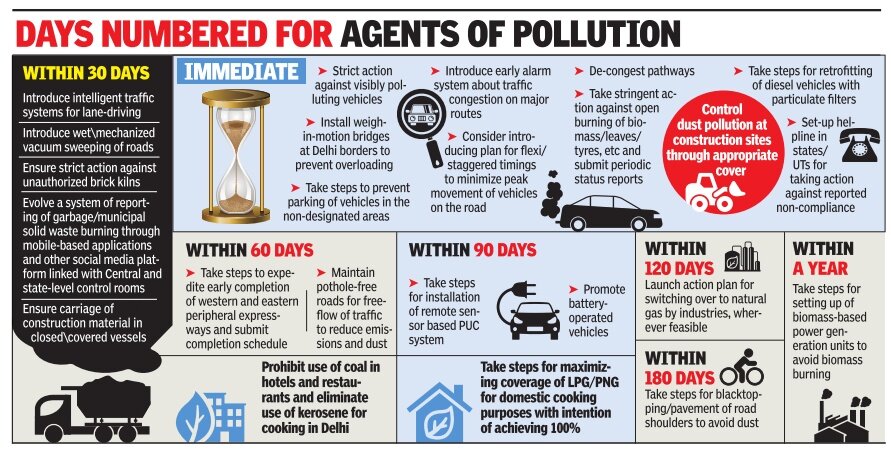Air pollution is a serious problem with environmental, public health and economic dimensions. Northern India gets exposed to hazardous levels of air quality almost every year.
Acknowledging this public health hazard, the centre government has promulgated an ordinance. Through this ordinance, the Centre set up a Commission for Air Quality Management (CAQM) in National Capital Region (NCR) and Adjoining Areas.
The commission replaces 22 year old Environment Pollution (Prevention and Control) Authority (EPCA) and envisages to streamline the public participation, the inter-State cooperation, the expert involvement and persistent research and innovation.
CAQM is a statutory mechanism to coordinate and oversee diverse efforts to improve air quality in Delhi, Punjab, Haryana, Rajasthan and UP, with the underlying remedial approach. The establishment of CAQM has the potential to address the problem of air pollution but an institution by itself is not a solution.
Significance of the New Commission
- Establishing a Statutory Body: So far, the matter was overseen by the Supreme Court-mandated Environment Pollution (Prevention and Control) Authority that had taken decisions like converting public transport to the CNG mode of fuel and imposing a pollution charge on old polluting vehicles.
- However, the EPCA was criticised for not exercising its statutory powers and for merely functioning as an advisory body to the Supreme Court.
- Through this ordinance, a statutory body is being set up to regulate the process by coordinating between the Central Government and the states concerned.
- Consolidated Approach: The ordinance envisages for consolidated approach towards monitoring, elimination of pollution sources and enforcement.
- The commission will have the power to coordinate with relevant state and central governments on the multi-sector plan including industry, power plants, agriculture, transport, residential and construction.
- Participatory Democracy: The Commission would function under the oversight of the elected representatives with regular reports to the Parliament.
- The ordinance claims, adding “the highest degree of democratic oversight would ensure effective enforcement of the efforts and proposals of the commission”.
- Removal of Ad-hocism: As the Commission is to function under the aegis and the overall supervision and guidance of the Central government, the ordinance hopes it would replace multitudes of committees, task forces, commissions and informal groups formed temporarily or otherwise, by various orders of the constitutional courts or the Centre and the States concerned and synergise the efforts of different stake-holders.
- Empowered Body: The new commission will reportedly have more powers — in its constitution and scope as well in terms of punitive provisions.
- The ordinance talks of a Rs 1 crore fine or five years’ imprisonment or both for violators of pollution control norms.
Associated Issues
- Federal Issue: The ordinance vests the commission with great power and its domain overlaps that of different state bodies.
- As the coordinating body, the commission will be dependent on states for enforcement.
- Separately, many areas of the commission’s mandate such as ending stubble burning and finding ways to lower carbon emissions from vehicle tailpipes involve economic tradeoffs and fiscal measures.
- As the five states are administered by different political parties, politics will have a say in the outcome.
- Dilution of Judicial Oversight: The intervention of the Supreme Court in environment protection matters stems from a deep distrust of the Executive. It is due to this Supreme Court established EPCA.
- As the ordinances dissolve all other committees and authorities that were set up under judicial and administrative orders, there are apprehensions of limiting the role of the judiciary and creating a supra-centralised framework for air-quality management in the region.
- Non-Inclusive: Air pollution impacts health, restrictions imposed to control air pollution impacts agricultural labourers and dealing with stubble burning requires incentives which is the domain of rural development.
- However, no farmers’ body has been allowed to be co-opted as members while representatives of any association or commerce or industry’ can be co-opted as members.
- Unrealistic Punitive Measures: By putting an unrealistic limit of Rs 1 crore to the fine payable, irrespective of the damage caused to the environment, the Ordinance is deviation from the polluter pays principle.
Conclusion
An impediment to improving air quality has been the inability and unwillingness of the authorities, particularly state governments, to address the issues outside of emergency situations or seasonal spikes.
Therefore, while coordination between authorities is, no doubt, a precondition for clearing the air, these have to be founded on policies to bring a holistic plan and enable behavioural changes for farmers to incentivise them to give up stubble burning.

we are here to make your civil services journey more focused and less time consume we are here to provide free education and quality education to all we will post weekly compenduim of the all the current affairs and the best articles from the indian express and the hindu so do like and subscribe to our plzz support us
ReplyDelete